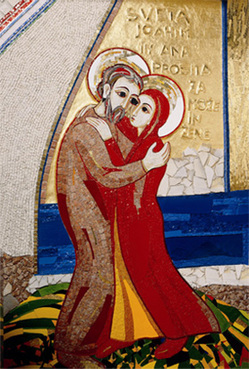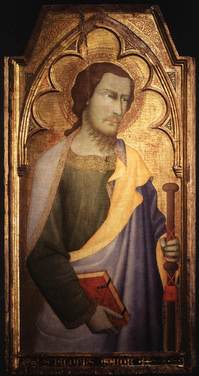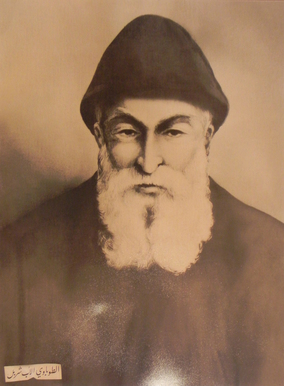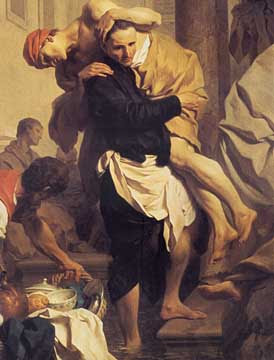Saints: July 2012 Archives
Let us praise Joachim and Anne, to whom, in their generation, the Lord gave him
who was a blessing for all the nations. (entr. ant.)

Since the sixth century the Eastern Church has venerated the memory of Saints Joachim and Anne; it was in the tenth century that the Western Church entered Anne's name into the martyrology and only recently have both been acknowledged together as the grandparents of Jesus.
Let's pray for grandparents, living and deceased through the intercession of Saints Joachim and Anne.
On grandparents, the Pope has said in 2008,
As regards the family, grandparents continue to be witnesses of unity, of solid values of faithfulness and that singular love from which faith and the joy of living flow.... In the face of the crisis of the family could it not be time to draw even more upon the presence and testimony of those -- grandparents -- who have a greater richness of values and experience? We couldn't, in fact, plan the future without recalling a past characterized by significant experiences and spiritual and moral points of reference. Thinking of grandparents, of their witness of love and faith to live, there come to mind the biblical figures of Abraham and Sara, Elizabeth and Zechariah, of Joachim and Anne, just like the elderly Simeon and Anna, or even Nicodemus: in every age, all of these recall for us how the Lord asks each to bring their own talents.

 O God, who called the Priest Saint Sharbel Makhūf to the solitary combat of the desert and imbued him with all manner of devotion, grant us, we pray, that, being made imitators of the Lord's Passion, we may merit to be co-heirs of his Kingdom.
O God, who called the Priest Saint Sharbel Makhūf to the solitary combat of the desert and imbued him with all manner of devotion, grant us, we pray, that, being made imitators of the Lord's Passion, we may merit to be co-heirs of his Kingdom.In the US, the Church liturgically remembers the patron saint of nurses, the sick and hospitals, Saint Camillus de Lellis. We the Church we pray for all those who dedicate their lives to the care of sick.
O God, who adorned the Priest Saint Camillus with a singular grace of charity towards the sick, pour out upon us, by his merits, a spirit of love for you, so that, serving you in our neighbor, we may, at the hour of death, pass safely over to you.
The Church proposes today Saint Camillus de Lellis (1550-1614), a man with a weighty past who gave his life to Christ and served the sick and the dying. He was influenced by the great Saint Philip Neri. The witness of Saint Camillus is one that we ought to pay attention to: Christ is present to us in those are sick.
More of Saint Camillus' life can be read here.
From Butler's Lives of the Saints 1894:

THE early years of Camillus gave no sign of sanctity. At the age of nineteen he took service with his father, an Italian noble, against the Turks, and after four years' hard campaigning found himself, through his violent temper, reckless habits, and inveterate passion for gambling, a discharged soldier, and in such straitened circumstances that he was obliged to work as a laborer on a Capuchin convent which was then building. A few words from a Capuchin friar brought about his conversion, and he resolved to become a religious. Thrice he entered the Capuchin novitiate, but each time an obstinate wound in his leg forced him to leave. He repaired to Rome for medical treatment, and there took St. Philip as his confessor, and entered the hospital of St. Giacomo, of which he became in time the superintendent. The carelessness of the paid chaplains and nurses towards the suffering patients now inspired him with the thought of founding a congregation to minister to their wants. With this end he was ordained priest, and in 1586 his community of the Servants of the Sick was confirmed by the Pope. Its usefulness was soon felt, not only in hospitals, but in private houses. Summoned at every hour of the day and night, the devotion of Camillus never grew cold. With a woman's tenderness he attended to the needs of his patients. He wept with them, consoled them, and prayed with them. He knew miraculously the state of their souls; and St. Philip saw angels whispering to two Servants of the Sick who were consoling a dying person. One day a sick man said to the Saint, "Father, may I beg you to make up my bed? it is very hard." Camillus replied, "God forgive you, brother! You beg me! Don't you know yet that you are to command me, for I am your servant and slave." "Would to God," he would cry, "that in the hour of my death one sigh or one blessing of these poor creatures might fall upon me!" His prayer was heard. He was granted the same consolations in his last hour which he had so often procured for others.
In the year 1614 he died with the full use of his faculties, after two weeks' saintly preparation, as the priest was reciting the words of the ritual, "May Jesus Christ appear to thee with a mild and joyful countenance!"

